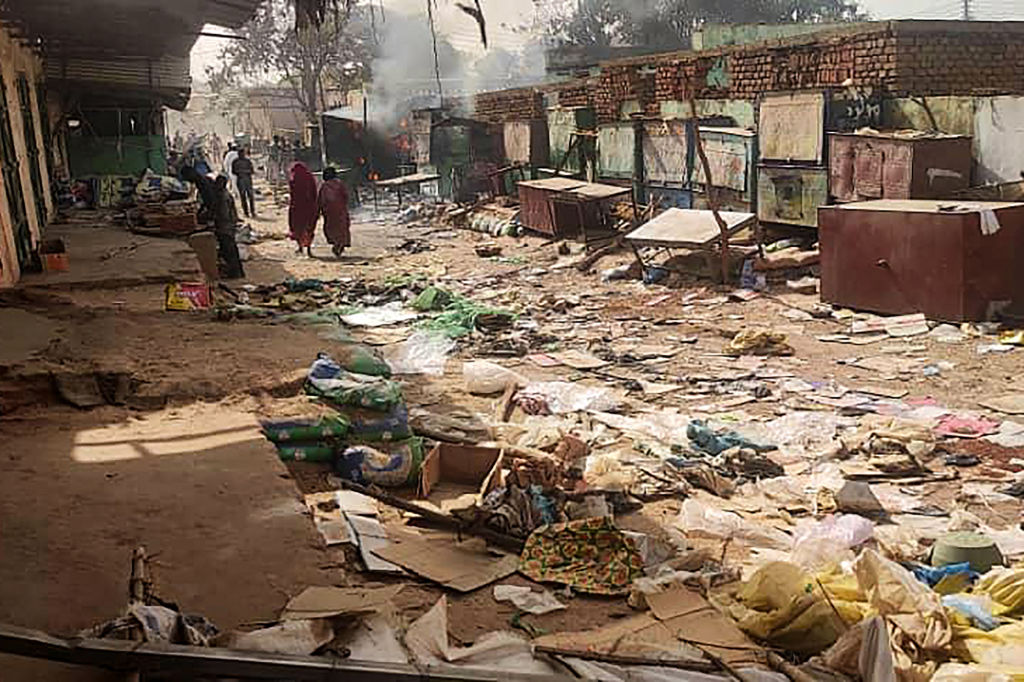ADF STAFF
The sounds of airstrikes, artillery and small-arms fire reverberate through the streets of Khartoum and Omdurman on opposite sides of the Nile as war persists in Sudan with no end in sight.
The Sudanese Armed Forces (SAF), led by Gen. Abdel-Fattah Burhan, has air supremacy. But the paramilitary Rapid Support Forces (RSF) and its leader, known as Hemedti, have an estimated 100,000 fighters experienced in urban warfare.
“We’re terrified; every day the strikes are getting worse,” Nahid Salah, a north Omdurman resident, told Reuters.
Initially focused on the capital, Khartoum, the fighting has spread through four of the five Darfur states and more recently into the North and South Kordofan states.
What already is a regional humanitarian crisis is threatening to spill into and destabilize neighboring countries.
“This is a human rights and humanitarian crisis that is unfolding at an alarming rate, on a devastating scale and with a complexity not seen before in the country,” Volker Türk, United Nations high commissioner for human rights, said during an interactive dialogue at the U.N. Human Rights Council on June 19.
“This is a crisis reverberating across an entire region. It is a powder keg.”
Since fighting began on April 15, nearly 3,000 Sudanese have been killed and roughly 2.5 million have been displaced.
Both sides have broken multiple cease-fire agreements and resisted attempts to negotiate a truce or even allow a humanitarian corridor.
The RSF has been accused of occupying and looting houses. Civil society groups say they have documented more than 80 cases of sexual violence by RSF fighters.
“The people of Sudan are suffering immeasurably,” Türk said. “The streets of Khartoum and its surrounding cities, of El Geneina and of El Obeid, are stained with the blood of civilians.
“And millions are still in need of vital humanitarian assistance, which in many places, has been all but impossible to deliver.”
The fighting in Darfur has taken on an ominously familiar ethnic focus. The RSF emerged from the notorious Janjaweed militia that drew charges of genocide against non-Arab minorities in 2003.
The U.N. has warned of possible new crimes against humanity in the current fighting in Darfur as the RSF and allied militias are accused of killing civilians as they flee El Geneina to Chad.
“Our U.N. human rights officers have heard multiple, corroborating accounts that ‘Arab’ militia are primarily targeting male adults from the Masalit community,” spokesperson Ravina Shamdasani said in a statement.
As fighting between the RSF and SAF rages, another concern is the growing involvement of other armed groups.
In South Kordofan, a faction of the rebel group Sudan People’s Liberation Movement-North seized several SAF bases, according to the June 23 situation report from The Armed Conflict Location & Event Data Project (ACLED).
“The expansion of the fighting and involvement of new armed groups further complicate the multifaceted crisis in Sudan and underscores the heightened risks faced by civilians across the country,” ACLED reported.
Extremist groups such as the Islamic State group and the Muslim Brotherhood have stated openly that their intention is to take advantage of the chaos and lawlessness to establish cells and recruit from a population devastated by war.
Mohamed Belaiche, head of the African Union Liaison Office in Sudan, laid blame for the carnage and destruction in Sudan primarily on the “fratricidal clashes between two military entities.”
The situation, he told Voice of America (VOA), poses “a real threat to peace and security throughout the Horn of Africa region.”
Enass Muzamel, a Sudanese human rights advocate, called for the international community to hold the warring generals accountable.
“The war is a result of generals who put their interests over those of their citizens,” she told VOA.
“The Sudanese people have nothing to do with this war, except to pay the price. The Sudanese people have been standing up against the oppressive regime, and now this bitter experience is what they have got.”

